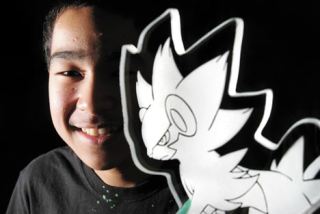At first, Steven Roberto was just attracted to the Pokemon cards and the pictures found on them. He would gravitate toward them at garage sales and buy old decks.
The game itself was not that important.
But that was then, this is now.
Today, a little more than two years later, the Kent 12-year-old is one of the top-ranked players in the world, racking up $5,500 in scholarships, two free trips to the world competition in the past two years, two Wii gaming consoles and multiple new sets of cards.
“Right now, I think I’m like (ranked) 18th (in North America),” Roberto said this past month, adding that at one point he was ranked No. 1 in the world.
The goal is to remain in the Top 25 so he gets another invite to the National Championship Tournament and then on to Worlds, where he’s admittedly “bombed out” in his first two appearances.
The reigning state champion is also looking to improve on his second- and third-place finishes, respectively, in the past two national tournaments.
“I want to win nationals really bad this year,” he said, his eyes lighting up. “I will keep trying until I get No. 1.”
Roberto’s meteoric rise to the top tier of Pokemon competition has been “phenomenal” according to his parents, Joyce and and Joe Roberto.
“My wife and I, we didn’t know anything about the game,” Joe said. “But he did very well.”
Soon after discovering the game, Roberto, who attends Vista Academy in Bellevue, began learning to play and started playing against himself, playing both sides of the battle.
The Pokemon card game is a complex series of moves and countermoves designed to mimic a battle between the two “trainers” and their cartoon armies. Play goes back and forth and good players plan think multiple moves ahead and even bluff and/or try to psyche out their opponent. Joe compares the game to chess because of the moves and countermoves.
“You think to think 10 turns ahead,” Steven said.
But the real test comes in selecting the 60 cards that make up a trainer’s deck. Called “building a deck,” it can be the difference between winning and losing and is where the key strategic decisions come into play.
Should the deck be aggressive and designed to go for the quick kill? Or is it better to play a longer game and build your deck accordingly?
“The build of the deck takes out the luck factor,” Roberto said. “You just have to find that balance.”
For his part, Roberto takes multiple decks, each put together differently, to a tournament and decides which to use based on his opponents.
In the beginning of his competitive play, Roberto said it was short-sighted deck building that held him back.
“I wasn’t really thinking long term,” he said with a shrug. “Almost half the thing is at the beginning of the turn.”
Once he started to figure out his strategy, Steven began to roll, ending 2008 with four straight victories at tournaments in Kirkland, Federal Way, Burien and Bremerton.
Many of the family’s weekends are now spent heading to and from Pokemon tournaments.
Our vacations revolve around Pokemon,” Joe said, adding that last year’s trip to Worlds in Columbus, Ohio, was not exactly the most exciting of trips for the family.
“Luckily, the location is moving this year,” he said of the St. Louis National Tournament in June. This year’s world competition is in San Diego, Calif.
But for all his success locally, regional and nationally, Roberto said he still has trouble in the World Tournaments, where kids from around the globe gather.
“Everyone’s speaking different languages,” Roberto said of the differences in play, adding that in last year’s tournament he went up against players from Germany, the Netherlands, Norway and Japan.
While the pressure may be on Roberto, Joe and Joyce say it is actually more difficult for them in the stands to sit and watch their son play than it seems to be for Roberto.
“He’s been through it a lot and knows what he has to do,” Joe said. “We’re a nervous wreck.”
Roberto said he plans to keep playing until he turns 15 and has to move to an older age group, where play becomes much more serious in tone. Until then, as long as he is having fun, his parents will keep taking him to tournaments.
“It’s up to him and it’s his responsibility to do what he needs to do,” said Joyce, adding that schoolwork is the top priority, but after that, it is up to Steven.
“Our view is asking if he’s still having fun,” Joe adds. “But it’s definitely a privilege; school work comes first.”
“Seems to be working so far,” Roberto added with a shrug.
Talk to us
Please share your story tips by emailing editor@kentreporter.com.
To share your opinion for publication, submit a letter through our website https://www.kentreporter.com/submit-letter/. Include your name, address and daytime phone number. (We’ll only publish your name and hometown.) Please keep letters to 300 words or less.

